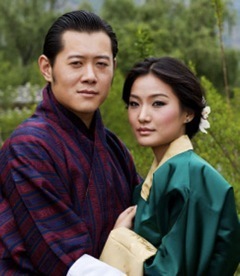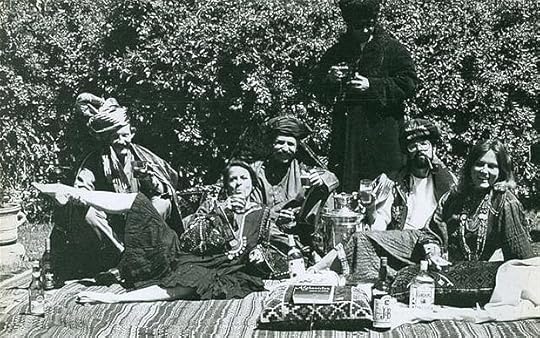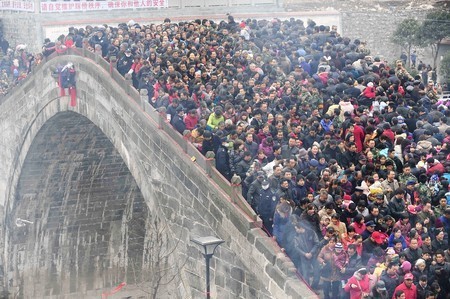Lisa Napoli's Blog, page 51
May 20, 2011
Another royal wedding
Looks like the King of Bhutan is soon to take a Queen:
AGENCE FRANCE PRESSE
NEW DELHI, May 20: The 31-year-old king of Bhutan, an Oxford-educated bachelor crowned in the remote Himalayan country in 2008, set up another royal wedding on Friday by announcing his engagement.
Jigme Khesar Namgyel Wangchuck, who helped usher in democracy in the Buddhist nation, revealed his intention to marry 20-year-old student Jetsun Pema during an address to parliament.
"As king, it is now time for me to marry. After much thought I have decided that the wedding shall be later this year," he announced, according to a copy of the speech sent to AFP.
"While she is young, she is warm and kind in heart and character," he said of the future queen, who appeared in traditional Bhutanese dress in a joint picture released of the couple.
The announcement clears the way for another wedding in a year of royal nuptials that has already seen Britain´s Prince William marry Kate Middleton in London in an event that captured the world´s attention.
In July, Prince Albert II of Monaco is to wed his swimming champion fiancee Charlene Wittstock.
"There will be a celebration, but His Majesty has requested that the government not make big plans and big celebrations," Dorji Wangchuck, from the royal press office, told AFP by telephone from the capital Thimphu.
"It is because of the lack of resources (in Bhutan) and secondly to make the celebrations more intimate and personal," he said, adding that the wedding was scheduled for October.
The king has known Pema, a student from Thimphu, "for quite some time", he said, adding that she had already begun to accompany the monarch on trips around the country.
Educated in India and Britain, where she attended Regents College in central London, Pema likes fine arts, painting and basketball, according to the official biography released by the king´s office.
Bhutan is one of the most remote and reclusive places on Earth, sandwiched between India and China.
It had no roads or currency until the 1960s, allowed television only in 1999 and continues to resist the temptation of allowing mass tourism — preferring instead to allow access to only small organised groups of well-heeled visitors.
It is also famed for the invention of Gross National Happiness, which is used to measure the progress and well-being of its citizens instead of Gross Domestic Product (GDP) other countries use to measure wealth.
Wangchuck, who can take multiple wives under the Bhutanese legal system, is widely revered by his subjects.
"It required an awful amount of restraint in parliament not to explode into spontaneous joy," the leader of the opposition in parliament, Tshering Tobgay, told AFP after hearing the news.
"Everybody will be overjoyed and will feel like celebrating, but it´s not our custom to go into the streets and make public our emotions. This is not Bhutanese."
Tobgay described the king´s fiancee as "very approachable", "very friendly" and "beautiful".
The relationship "wasn´t completely public, but it wasn´t obviously hidden either", he said.
The king was crowned in 2008 following the abdication of his father, who began the process of introducing democracy to the staunchly traditional and insular nation in 2001.
Former king Jigme Singye Wangchuck stepped down saying he wanted the shift to democracy to be matched with a change of face in the white-walled royal palace that overlooks Thimphu.
In his first speech after his coronation, the current king pledged to shield Bhutan from the negative forces of globalisation.
"My deepest concern is that as the world changes we may lose these fundamental values on which we rest our character as a nation and people," he said at the time.








May 19, 2011
Bhutan Observer: Bhutanese film selected for Cannes Film Festival
May 17, 2011
The Container, a Bhutanese-Australian co‐produced film, has been chosen for the Short Film Corner of the Cannes Film Festival in France.
According to the director, Jamjang Dorji, the film is based on a true story set in Bhutan in the 1980s. The story revolves around a mother's devotion to her child. The mother walks for days from a remote community to get medicine for her seriously ill child.
Once there, in a cruel twist of fate, she learns that although medicine is provided for free by the government, she must supply a container. She doesn't have a bottle and can't afford to buy one, and the search for a container begins.
Shot in Gaselo, Wangdue, by Sonam Loday, the film stars Deki Yangzom from Travellers and Magicians. The film was produced by Claudia Jamyang and Julia Booth and edited by Heidi Kenesey.
This film is not about a child being sick, but about how as parents we worry about our children even if it is nothing serious, director Jamyang Dorji told in a statement.
The Container is the first Bhutanese short film to be seen at an international film festival. The Short Film Corner selects entrants from thousands of short productions from around the world.
The Container will be screened at Cannes today and tomorrow.
The Cannes Film Festival's Short Film Corner serves as a showcase of worldwide short productions while providing opportunities for filmmakers to present their works for viewing by industry professionals.
By Namgay Tshering








Paradise
First Shangri-la. Now paradise in the form of Panama. (Thanks, Kusala!)
PARAISO FOR SALE – Trailer from Impacto Films on Vimeo.








May 18, 2011
@Chicago and Printer's Row
Hey, anyone who'll be in and around Chicago on June 4th:
Got my Printer's Row Book Festival assignment today. Looks like I'm on a panel with my new friend Cheryl Tan (whose book, A Tiger in the Kitchen, is about revisiting her native Singapore through the lens of food) and an old colleague from Marketplace whom I've never met before, Miranda Kennedy, whose book, Sideways on a Scooter, is about her life in India.
Details:
Saturday, 6/4/2011, 12:30 P.M. – 1:15 P.M.
Program: Panel Discussion: Journey Back to Self: Miranda Kennedy, Cheryl Lu-Lien Tan and Lisa Napoli moderated by Janet Desaulniers
Location: Hotel Blake








Bhutanese refugees/folk dance in Pittsburgh
Setting a goal of happiness can backfire
So says yet another study, this one published in the Perspectives on Psychological Science. (Thanks, Stacie!)
Excerpt:
The tools often suggested for making yourself happy aren't necessarily bad — like taking time every day to think about things you're happy about or grateful for, or setting up situations that are likely to make you happy. "But when you're doing it with the motivation or expectation that these things ought to make you happy, that can lead to disappointment and decreased happiness," Gruber says. For example, one study by Mauss and colleagues found that people who read a newspaper article extolling the value of happiness felt worse after watching a happy film than people who read a newspaper article that didn't mention happiness — presumably because they were disappointed they didn't feel happier. When people don't end up as happy as they'd expected, their feeling of failure can make them feel even worse.








Lisa is sending you some Dilbert!














HI
Your friend Lisa wanted us to send you this from Dilbert.com.



What can you find on Dilbert.com?
Color Dilbert strips every day
Dilbert Archives
Rank the strips and save your faves
Animated Dilbert
Share Dilbert with all your friends & fellow cubemates
Widgets to post to facebook, MySpace, iGoogle, blogs and more
See if you are as funny as Scott Adams with new Mashups!
IT'S ALL FREE!
What are you waiting for?
DID WE MENTION IT'S FREE?
This email is generated from Dilbert.com and sent to you by Lisa
This does not subscribe you to any emails from Dilbert.com.
Dilbert ©2011 | Universal Uclick | 1130 Walnut Street, Kansas City, MO. 64106








May 16, 2011
Carla Grissmann
An amazing woman. I'm posting this story from the Times of London to the blog because even though this isn't explicitly a happiness bit nor a Bhutanese one, this lady lived her life the way she wanted. What could be better? (Thanks to Craig for sending along.)
Carla Grissmann
Carla Grissmann, who died in London on February 15 aged 82, devoted much of her life to preserving the cultural heritage of Afghanistan.
Image 1 of 4
Carla Grissmann (second left) and friends at a party in Afghanistan
An American traveller who went to Kabul in the late 1960s "out of curiosity", Carla Grissmann lived there on and off for more than 30 years, helping to look after and catalogue the remarkable collection at Afghanistan's National Museum. She was even in the city sporadically after the Soviet invasion of 1979 as well as during the Taliban ascendancy between 1996 and 2001.
Part of the National Museum's collection was the Tillya Tepe gold (popularly known as the Bactrian treasure), part of which is currently on show at the British Museum until July 3. The gold — more than 20,000 pieces, principally items of personal adornment — was unearthed in 1979 by the Russian archaeologist Viktor Sarianidi, who was excavating six tombs from the 1st century AD at Tillya Tepe, in the north of Afghanistan.
Time was of the essence as the site became vulnerable to looting, and Carla Grissmann was among the first to handle the precious finds as they arrived in Kabul. "I remember the gold arriving at the museum in paper bags, even a PIA [Pakistan International Airlines] sick bag," she later recalled. She immediately set about making an inventory with archaeologists and curators at the museum.
The treasure's survival during the conflict that engulfed Afghanistan in the late 20th century was thanks to a decision, in 1989, to remove it from the museum, situated on the outskirts of Kabul, to a secret vault beneath the Central Bank of Afghanistan in the city. A small group of archaeologists, curators and workers at the bank had the necessary keys, and swore each other to secrecy.
The Taliban made several unsuccessful attempts to penetrate the vault, and the gold was eventually retrieved in 2004. It is a measure of the respect in which Carla Grissmann was held in Afghanistan that, when it came to making an inventory of the recovered items, the Afghans insisted that it be carried out by her. The museum has now been rebuilt, and the Bactrian treasure will eventually return there after it has toured the world.
During Carla Grissmann's years in Kabul, the dangers faced by her and her colleagues were considerable. In the early 1990s, when the rival Mujahideen were fighting for control of Kabul, the staff were sometimes unable to reach the museum at all because of shelling and rocket fire; once 14 rockets hit the museum in a single day. Carla Grissmann recalled: "I was standing outside when a jet streaked by so low that stones suddenly began sizzling through the air all around me."
In 1994 the museum was largely destroyed, and the staff moved some 6,500 of the remaining artefacts to the Kabul Hotel. Conditions there were scarcely ideal: the generator had been stolen, and the museum staff had to work in the basement storeroom by the light of kerosene lamps; the rooms were airless and thick with dust.
Some items from the museum were concealed, to be retrieved only after the fall of the Taliban. Carla Grissmann was privy to their whereabouts, but never revealed the details.
Carla Grissmann was born in Chicago on September 2 1928 and grew up in Bronxville, New York, where her father ran a business selling nylon stockings from an office in the Empire State Building. She read English at Barnard College in Manhattan, and in 1948 travelled to Europe, completing her studies in Geneva. She then moved to Paris, where she worked as an assistant editor for the magazine Réalités.
She later reflected of her time in Paris: "You have an interesting job, a cosy place to live and a few good friends you see regularly. You go out to dinner once a week, and take a trip once a year. Nothing ever really happens, but one is comfortable and, before you know it, 10 years have gone by."
Carla Grissmann decamped to Tangier, where she taught at the American School. In August 1962 she met the American writer John Hopkins at a vernissage at the Casino de Tanger. "Carla was characteristically dressed in black," he recorded. "Her hair was done up in a bun. She wore bright red lipstick. She looked like a schoolmarm — a chic, sophisticated, Parisian schoolmarm. Her skin was brown from a summer spent in the south of France. She was very beautiful … [She] went everywhere in Tangier on foot, in high heels." Both she and Hopkins had teaching jobs at the American School. On Sunday nights they dined at the Paname Restaurant on Boulevard Pasteur, where they might be joined by figures such as William Burroughs and Timothy Leary.
Carla Grissmann next went to Tunis, where she worked on a research project for Harvard University, and thence to Israel, where she worked as a journalist on the Jerusalem Post. She also spent a year in a Turkish village, many years later publishing an account of her experiences, A Dinner of Herbs (2001).
In 1969, after a two-day bus journey from Tehran, she arrived in Kabul, where the Peace Corps found her a job at the zoo. Although she was theoretically hired as the zoo's accountant, her duties included looking after Bobby the Chimp. (Ten years later Bobby would be killed when the invading Soviets shelled the zoo.)
Carla Grissmann soon found her niche at the National Museum, and showed her mettle on her very first day, when she found the lavatory embedded in dirt: it hadn't been cleaned in 20 years. She immediately set to work with her Swiss army knife, boiling water and ammonia, enlisting the help of some security guards. "After four days it was gleaming," she said with satisfaction. "We Americans require immediate results." The security guards joked that there should be a plaque reading: "This site excavated by Carla Grissmann."
She revelled in roughing it, sleeping on the floor of her unheated house on Kabul's Chicken Street. She was as happy with a dinner of cold chapatis on a mud floor as she was with paté and champagne on a white tablecloth. Her usual comment when undergoing hardship was: "I offer it up to the Afghans."
As the years passed she became a familiar figure in Kabul's bazaars. Always sensitive to local customs, she was greatly respected by the local people. Although she was soft-spoken, sometimes seemingly timid, she stood by her convictions, and even in the face of adversity retained her sense of humour. She always wore a chiffon headscarf and dressed entirely in black — because, she told a friend, it saved on the dry cleaning bills.
On average Carla Grissmann spent five months a year in Kabul . For the rest of the time she worked for the Asia Foundation, establishing English language centres in the science faculties of universities in Sri Lanka and Pakistan. On one such mission, in Peshawar, she heard gunfire every night as gangs of Taliban roamed the streets hunting down doctors, lawyers and intellectuals, shooting them on sight.
Wherever she went in the world, she carried a small trunk with wall hangings, paintings and exquisite objects to adorn her temporary home. For the past 30 years she had had a base in south-west London, a rented flat in Redcliffe Gardens, where she would receive a steady stream of visitors. Latterly confined to a wheelchair, she retained all her customary joie de vivre, always celebrating "cocktail hour" at 6pm sharp.
Although Carla Grissmann had many suitors, she never married.








In China, gauging happiness is all the rage
From today's LA Times:
Excerpt:
"The concept of happiness, xingfu, is somewhat alien here, there being no equivalent of Thomas Jefferson, credited with enshrining "the pursuit of happiness" at the same level as life and liberty in the Declaration of Independence. (An exception is one verse of the revolutionary ballad "The East is Red," which states that "Chairman Mao seeks happiness for his people.")
But suddenly, happiness is on the tip of every Chinese politician's tongue. "Everything we do is aimed at letting people live more happily and with more dignity," Premier Wen Jiabao declared in his New Year's address to the nation. During the National People's Congress and Chinese People's Political Consultative Conference in March, it came up so often that the official New China News Agency proclaimed, "No doubt, 'happiness' is the keyword for the two sessions."
In Mianyang, Sichuan province, people drop old clothes and coins off Tai Ping Bridge every year to bring happiness and health. Happiness is an elusive concept in modern China.(Reuters / March 24, 2011)








Achieving happiness: view midlife in a positive light
Excerpt:
"In his latest book, "Flourish" (2011), the father of positive psychology, Martin Seligman, cites studies that show there are five core features of people who have high levels of well-being. Referred to as PERMA, they are "Positive" emotions, "Engagement," "Meaning," "Relationships" and "Achievement." Individuals who thrive characteristically have high self-esteem, optimism, resilience, vitality, self-determination and overwhelmingly positive relationships.
It's important to note that recent longitudinal research has revealed it's primarily the choices we make in life that determines our level of well-being. That means we can learn to be happier, more successful, and profoundly satisfied in our relationships. We can recapture the thrill we once had when we felt we were a rising star at work, rekindle the passion of being in an exciting relationship, and rediscover our hopes and dreams for making a meaningful contribution to the world.
Why do many people languish in midlife? Not just because they made some poor choices that led to some bad outcomes, but because they let those choices define them…"























